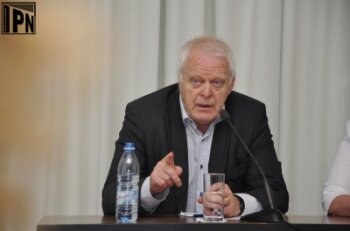Thomas Hammarberg recommends to destroy illegal recordings
25 July, 2013
 The Commission set up in Georgia to oversee the handling of material which had resulted from illegal surveillance activities in the past years had a meeting on 13 July 2013 in Tbilisi to which Thomas Hammarberg, the EU Special Adviser on Legal and Constitutional Reform and Human Rights in Georgia, was invited.
The Commission set up in Georgia to oversee the handling of material which had resulted from illegal surveillance activities in the past years had a meeting on 13 July 2013 in Tbilisi to which Thomas Hammarberg, the EU Special Adviser on Legal and Constitutional Reform and Human Rights in Georgia, was invited.At the meeting information was provided by the Chief Prosecutor and the Minister of Internal Affairs on the number and nature of videos and audiotapes which had been stored in the Ministry (MIA). The main focus of the discussion was on the illegal recordings of private life situations (primarily of a sexual nature), though problems relating to other types of illegal recordings were mentioned as well.
Thomas Hammarberg has prepared recommendations about the above-mentioned illegal recordings.
According to the recommendations, the existence of the illegal recordings is a reflection of extremely serious crimes requiring both a judicial and a political response. The recording was criminal in all its aspects: including the planning thereof, the instruction to take such action and the actual activities to film or tape. The possession of these recordings must be criminalized (with the exception, of course, of the authorized archiving mentioned above). The dissemination of the recordings violating privacy rights must also be regarded as criminal. That any blackmail activity on the basis of these recordings must be seen as a serious crime is obvious.
‘The aim should be to protect the privacy of all persons who have been targeted. At the same time it is important to collect evidence which could strengthen legal actions against the culprits.
My suggestion is that a combination of these two intentions would guide a proper, fast and efficient review of the recorded material. The procedures for this review should be determined by the Commission in order to see that its members would be able to verify the way the review was undertaken and its results. It would be sensible that at least one of the civil society representatives or the data protection inspector take a direct part in the review itself. A major purpose of this review is to prepare for the destruction of recordings. That the destroyed recordings did exist would be verified by the Commission in a special, signed document. The review might make it possible to identify elements which can be used in criminal investigation and prosecution. However, such activities must be pursued without undermining or risking the privacy rights of individual victims. In individual cases in which there would be a direct conflict between those two interests, the concern for the right to privacy should be the determining consideration. While this approach would take a somewhat longer amount of time than the immediate destruction of all privacy sensitive recordings, it is particularly important that the management of the archive with the recordings is protecting the confidentiality and that any access to the archive be strictly limited and regulated. This approach puts great responsibility on the shoulders of the Commission members. This makes it even more important that there is a clearly defined task for the Commission, approved by the government. In this process it is recommended that the possibility of adding some other experts to the membership is considered. It is suggested that also a representative of the Ministry of Justice is included’, Thomas Hammarberg’s recommendations say.
Related stories:
More documents and video material discovered in Samegrelo by Interior Ministry
Interior Minister introduced criminal footage to media and NGO representatives
“This is horrifying footage” – Reactions of Media and NGO representatives after viewing criminal video
Drugs, explosives, covert recordings found underground in Samegrelo





















































